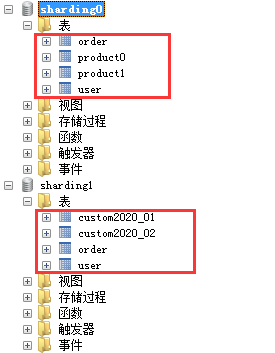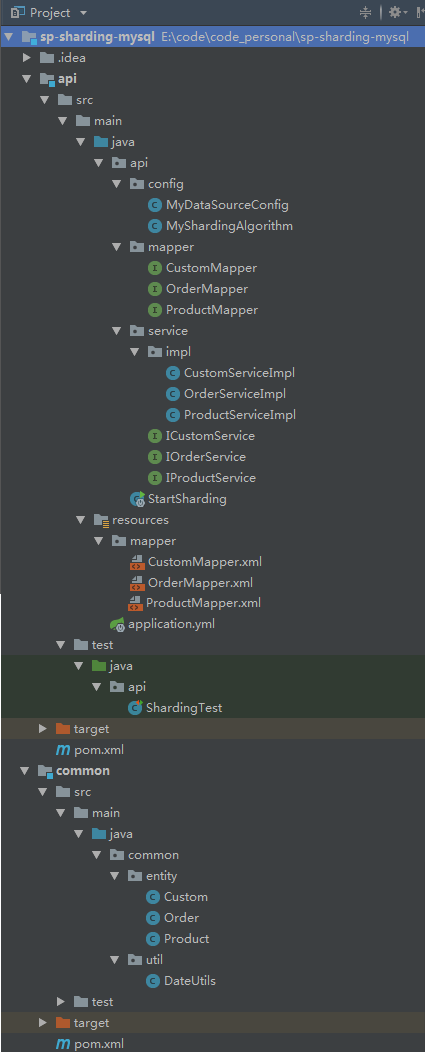1、官网文档参考:
https://shardingsphere.apache.org/document/current/cn/quick-start/sharding-jdbc-quick-start/
2、首先建立测试的数据库表:
(1)表结构如下:

(2)建表脚本如下:
CREATE DATABASE `sharding0` DEFAULT CHARACTER SET utf8 COLLATE utf8_general_ci; USE `sharding0`; CREATE TABLE `order` ( `order_id` bigint(20) NOT NULL COMMENT '订单ID', `order_amount` decimal(20,4) DEFAULT NULL COMMENT '订单金额', `create_time` datetime DEFAULT NULL COMMENT '创建时间', `user_id` bigint(20) NOT NULL COMMENT '用户ID', PRIMARY KEY (`order_id`) ) ENGINE=InnoDB DEFAULT CHARSET=utf8; CREATE TABLE `product0` ( `product_id` bigint(20) NOT NULL COMMENT '商品ID', `product_name` varchar(50) DEFAULT NULL COMMENT '商品名称', `product_price` decimal(20,4) DEFAULT NULL COMMENT '商品价格', `create_time` datetime DEFAULT NULL COMMENT '创建时间' ) ENGINE=InnoDB DEFAULT CHARSET=utf8; CREATE TABLE `product1` ( `product_id` bigint(20) NOT NULL COMMENT '商品ID', `product_name` varchar(50) DEFAULT NULL COMMENT '商品名称', `product_price` decimal(20,4) DEFAULT NULL COMMENT '商品价格', `create_time` datetime DEFAULT NULL COMMENT '创建时间' ) ENGINE=InnoDB DEFAULT CHARSET=utf8; CREATE TABLE `user` ( `user_id` bigint(20) NOT NULL COMMENT '用户ID', `user_name` varchar(50) NOT NULL COMMENT '用户名', PRIMARY KEY (`user_id`) ) ENGINE=InnoDB DEFAULT CHARSET=utf8;
CREATE DATABASE `sharding1` DEFAULT CHARACTER SET utf8 COLLATE utf8_general_ci; USE `sharding1`; CREATE TABLE `custom2020_01` ( `custom_id` bigint(20) NOT NULL COMMENT '主键ID', `create_time` datetime NOT NULL COMMENT '创建时间' ) ENGINE=InnoDB DEFAULT CHARSET=utf8; CREATE TABLE `custom2020_02` ( `custom_id` bigint(20) NOT NULL COMMENT '主键ID', `create_time` datetime NOT NULL COMMENT '创建时间' ) ENGINE=InnoDB DEFAULT CHARSET=utf8; CREATE TABLE `order` ( `order_id` bigint(20) NOT NULL COMMENT '订单ID', `order_amount` decimal(20,4) DEFAULT NULL COMMENT '订单金额', `create_time` datetime DEFAULT NULL COMMENT '创建时间', `user_id` bigint(20) NOT NULL COMMENT '用户ID', PRIMARY KEY (`order_id`) ) ENGINE=InnoDB DEFAULT CHARSET=utf8; CREATE TABLE `user` ( `user_id` bigint(20) NOT NULL COMMENT '用户ID', `user_name` varchar(50) NOT NULL COMMENT '用户名', PRIMARY KEY (`user_id`) ) ENGINE=InnoDB DEFAULT CHARSET=utf8;
3、编写测试代码:
(1)代码结构如下(采用Maven多模块):

(2)sp-sharind-mysql 模块的POM.XML配置如下:
<?xml version="1.0" encoding="UTF-8"?> <project xmlns="http://maven.apache.org/POM/4.0.0" xmlns:xsi="http://www.w3.org/2001/XMLSchema-instance" xsi:schemaLocation="http://maven.apache.org/POM/4.0.0 http://maven.apache.org/xsd/maven-4.0.0.xsd"> <modelVersion>4.0.0</modelVersion> <groupId>sp-sharding-mysql</groupId> <artifactId>sp-sharding-mysql</artifactId> <packaging>pom</packaging> <version>1.0</version> <name>sp-sharding-mysql</name> <properties> <project.build.sourceEncoding>UTF-8</project.build.sourceEncoding> <project.reporting.outputEncoding>UTF-8</project.reporting.outputEncoding> <java.version>1.8</java.version> <druid.version>1.1.10</druid.version> <mysql.version>5.1.45</mysql.version> <lombok.version>1.16.20</lombok.version> <mybatis.version>2.1.0</mybatis.version> <spring-boot.version>2.1.6.RELEASE</spring-boot.version> <sharding-jdbc-core.version>4.0.0</sharding-jdbc-core.version> </properties> <!-- 定义包信息,统一管理 --> <dependencyManagement> <dependencies> <!--使用 spring-boot-dependencies 管理包依赖--> <dependency> <groupId>org.springframework.boot</groupId> <artifactId>spring-boot-dependencies</artifactId> <version>${spring-boot.version}</version> <type>pom</type> <scope>import</scope> </dependency> <!-- fastjson --> <dependency> <groupId>com.alibaba</groupId> <artifactId>fastjson</artifactId> <version>${fastjson.version}</version> </dependency> <!-- mybatis --> <dependency> <groupId>org.mybatis.spring.boot</groupId> <artifactId>mybatis-spring-boot-starter</artifactId> <version>${mybatis.version}</version> </dependency> <!-- druid --> <dependency> <groupId>com.alibaba</groupId> <artifactId>druid-spring-boot-starter</artifactId> <version>${druid.version}</version> </dependency> <!-- mysql --> <dependency> <groupId>mysql</groupId> <artifactId>mysql-connector-java</artifactId> <version>${mysql.version}</version> </dependency> <!-- sharding-jdbc-core --> <dependency> <groupId>org.apache.shardingsphere</groupId> <artifactId>sharding-jdbc-core</artifactId> <version>${sharding-jdbc-core.version}</version> </dependency> <!-- lombok --> <dependency> <groupId>org.projectlombok</groupId> <artifactId>lombok</artifactId> <version>${lombok.version}</version> </dependency> </dependencies> </dependencyManagement> <!-- 聚合子模块 --> <modules> <module>common</module> <module>api</module> </modules> </project>
(2)common 模块的POM.XML配置如下:
<?xml version="1.0" encoding="UTF-8"?> <project xmlns="http://maven.apache.org/POM/4.0.0" xmlns:xsi="http://www.w3.org/2001/XMLSchema-instance" xsi:schemaLocation="http://maven.apache.org/POM/4.0.0 http://maven.apache.org/xsd/maven-4.0.0.xsd"> <parent> <artifactId>sp-sharding-mysql</artifactId> <groupId>sp-sharding-mysql</groupId> <version>1.0</version> </parent> <modelVersion>4.0.0</modelVersion> <groupId>common</groupId> <artifactId>common</artifactId> <version>1.0</version> <name>common</name> <dependencies> <!-- mybatis --> <dependency> <groupId>org.mybatis.spring.boot</groupId> <artifactId>mybatis-spring-boot-starter</artifactId> </dependency> <!-- druid --> <dependency> <groupId>com.alibaba</groupId> <artifactId>druid-spring-boot-starter</artifactId> </dependency> <!-- mysql --> <dependency> <groupId>mysql</groupId> <artifactId>mysql-connector-java</artifactId> </dependency> <!-- lombok --> <dependency> <groupId>org.projectlombok</groupId> <artifactId>lombok</artifactId> </dependency> </dependencies> <build> <plugins> <plugin> <groupId>org.springframework.boot</groupId> <artifactId>spring-boot-maven-plugin</artifactId> </plugin> </plugins> </build> </project>
(3)api 模块的POM.XML配置如下:
<?xml version="1.0" encoding="UTF-8"?> <project xmlns="http://maven.apache.org/POM/4.0.0" xmlns:xsi="http://www.w3.org/2001/XMLSchema-instance" xsi:schemaLocation="http://maven.apache.org/POM/4.0.0 http://maven.apache.org/xsd/maven-4.0.0.xsd"> <parent> <artifactId>sp-sharding-mysql</artifactId> <groupId>sp-sharding-mysql</groupId> <version>1.0</version> </parent> <modelVersion>4.0.0</modelVersion> <groupId>api</groupId> <artifactId>api</artifactId> <version>1.0</version> <name>api</name> <dependencies> <!-- 引入公共 common 模块 --> <dependency> <groupId>common</groupId> <artifactId>common</artifactId> <version>1.0</version> </dependency> <!-- 引入 sharding-jdbc-core --> <dependency> <groupId>org.apache.shardingsphere</groupId> <artifactId>sharding-jdbc-core</artifactId> </dependency> <dependency> <groupId>org.springframework.boot</groupId> <artifactId>spring-boot-starter</artifactId> </dependency> <dependency> <groupId>org.springframework.boot</groupId> <artifactId>spring-boot-starter-web</artifactId> </dependency> <dependency> <groupId>org.springframework.boot</groupId> <artifactId>spring-boot-starter-test</artifactId> <scope>test</scope> </dependency> </dependencies> </project>
(4)MyDataSourceConfig类:
package api.config; import com.alibaba.druid.spring.boot.autoconfigure.DruidDataSourceBuilder; import org.apache.ibatis.session.SqlSessionFactory; import org.apache.shardingsphere.api.config.sharding.ShardingRuleConfiguration; import org.apache.shardingsphere.api.config.sharding.TableRuleConfiguration; import org.apache.shardingsphere.api.config.sharding.strategy.InlineShardingStrategyConfiguration; import org.apache.shardingsphere.api.config.sharding.strategy.StandardShardingStrategyConfiguration; import org.apache.shardingsphere.shardingjdbc.api.ShardingDataSourceFactory; import org.mybatis.spring.SqlSessionFactoryBean; import org.springframework.beans.factory.annotation.Qualifier; import org.springframework.boot.context.properties.ConfigurationProperties; import org.springframework.context.annotation.Bean; import org.springframework.context.annotation.Configuration; import org.springframework.core.io.support.PathMatchingResourcePatternResolver; import org.springframework.jdbc.datasource.DataSourceTransactionManager; import javax.sql.DataSource; import java.util.HashMap; import java.util.Map; import java.util.Properties; /** * 数据源配置 */ @Configuration public class MyDataSourceConfig { @Bean(name="sharding0") @ConfigurationProperties(prefix = "datasource.sharding0") public DataSource getFirstDataSource() { return DruidDataSourceBuilder.create().build(); } @Bean(name="sharding1") @ConfigurationProperties(prefix = "datasource.sharding1") public DataSource getSecondDataSource() { return DruidDataSourceBuilder.create().build(); } @Bean(name="shardingDataSource") public DataSource shardingDataSource(@Qualifier("sharding0") DataSource sharding0, @Qualifier("sharding1") DataSource sharding1) throws Exception { // 配置 user 表规则 TableRuleConfiguration userTableRuleConfig = new TableRuleConfiguration("user", "sharding${0..1}.user"); // 配置 order 表规则 TableRuleConfiguration orderTableRuleConfig = new TableRuleConfiguration("order", "sharding${0..1}.order"); // 配置 product 表规则 TableRuleConfiguration productTableRuleConfig = new TableRuleConfiguration("product", "sharding0.product${0..1}"); // 配置 custom 表规则 TableRuleConfiguration customTableRuleConfig = new TableRuleConfiguration("custom", "sharding1.custom${['2020_01','2020_02']}"); // 配置 order 表分库策略(根据 order_id 取模分片) orderTableRuleConfig.setDatabaseShardingStrategyConfig(new InlineShardingStrategyConfiguration("order_id", "sharding${order_id % 2}")); // 配置 product 表分表策略(根据 product_id 取模分片) productTableRuleConfig.setTableShardingStrategyConfig(new InlineShardingStrategyConfiguration("product_id", "product${product_id % 2}")); // 配置 custom 表分表策略(根据 create_time 进行分片) customTableRuleConfig.setTableShardingStrategyConfig(new StandardShardingStrategyConfiguration("create_time", new MyShardingAlgorithm())); // 配置分片规则 ShardingRuleConfiguration shardingRuleConfig = new ShardingRuleConfiguration(); shardingRuleConfig.getTableRuleConfigs().add(userTableRuleConfig); shardingRuleConfig.getTableRuleConfigs().add(orderTableRuleConfig); shardingRuleConfig.getTableRuleConfigs().add(productTableRuleConfig); shardingRuleConfig.getTableRuleConfigs().add(customTableRuleConfig); // 获取数据源对象 Map<String, DataSource> dataSourceMap = new HashMap<>(); dataSourceMap.put("sharding0", sharding0); dataSourceMap.put("sharding1", sharding1); DataSource dataSource = ShardingDataSourceFactory.createDataSource(dataSourceMap, shardingRuleConfig, new Properties()); return dataSource; } @Bean public SqlSessionFactory sqlSessionFactory(@Qualifier("shardingDataSource") DataSource dataSource) throws Exception { SqlSessionFactoryBean sqlSessionFactory = new SqlSessionFactoryBean(); sqlSessionFactory.setDataSource(dataSource); // 设置 *.Mapper 映射文件所在路径 sqlSessionFactory.setMapperLocations(new PathMatchingResourcePatternResolver().getResources("classpath:mapper/**/*Mapper.xml")); // 设置实体类所在路径 sqlSessionFactory.setTypeAliasesPackage("common.entity"); return sqlSessionFactory.getObject(); } @Bean public DataSourceTransactionManager shardTransactionManager(@Qualifier("shardingDataSource") DataSource dataSource) { return new DataSourceTransactionManager(dataSource); } }
(4)MyShardingAlgorithm类:
package api.config; import common.util.DateUtils; import org.apache.shardingsphere.api.sharding.standard.PreciseShardingAlgorithm; import org.apache.shardingsphere.api.sharding.standard.PreciseShardingValue; import java.util.Collection; import java.util.Date; /** * 自定义数据分片实现 */ public class MyShardingAlgorithm implements PreciseShardingAlgorithm<Date> { @Override public String doSharding(Collection<String> collection, PreciseShardingValue<Date> preciseShardingValue) { // 通过日期对数据进行分片 Date keyDate = preciseShardingValue.getValue(); String dateStr = DateUtils.formatDate(keyDate, "yyyy_MM"); for (String tableName : collection) { if (tableName.indexOf(dateStr) > 0) { return tableName; } } return null; } }
(5)CustomMapper 接口:
package api.mapper; import common.entity.Custom; public interface CustomMapper { void addCustom(Custom custom); }
(6)OrderMapper 接口:
package api.mapper; import common.entity.Order; import java.util.List; public interface OrderMapper { void addOrder(Order order); void addBatchOrder(List<Order> list); List<Order> getOrderList(); List<Order> getOrderListByIn(List<Long> list); List<Order> getOrderListByJoin(); }
(7)ProductMapper 接口:
package api.mapper; import common.entity.Product; import java.util.List; public interface ProductMapper { void addProduct(Product product); void addBatchProduct(List<Product> list); }
(8)ICustomService 接口:
package api.service; import common.entity.Custom; public interface ICustomService { void addCustom(Custom custom); }
(9)CustomServiceImpl 类:
package api.service.impl; import api.mapper.CustomMapper; import api.service.ICustomService; import common.entity.Custom; import org.springframework.beans.factory.annotation.Autowired; import org.springframework.stereotype.Service; import org.springframework.transaction.annotation.Transactional; @Service @Transactional public class CustomServiceImpl implements ICustomService { @Autowired CustomMapper customMapper; @Override public void addCustom(Custom custom) { customMapper.addCustom(custom); } }
(10)IOrderService 接口:
package api.service; import common.entity.Order; import java.util.List; public interface IOrderService { void addOrder(Order order); void addBatchOrder(List<Order> list); List<Order> getOrderList(); List<Order> getOrderListByIn(List<Long> list); List<Order> getOrderListByJoin(); }
(11)OrderServiceImpl 类:
package api.service.impl; import api.mapper.OrderMapper; import api.service.IOrderService; import common.entity.Order; import org.springframework.beans.factory.annotation.Autowired; import org.springframework.stereotype.Service; import org.springframework.transaction.annotation.Transactional; import java.util.List; @Service @Transactional public class OrderServiceImpl implements IOrderService { @Autowired OrderMapper orderMapper; @Override public void addOrder(Order order) { orderMapper.addOrder(order); } @Override public void addBatchOrder(List<Order> list) { orderMapper.addBatchOrder(list); } @Override public List<Order> getOrderList() { return orderMapper.getOrderList(); } @Override public List<Order> getOrderListByIn(List<Long> list) { return orderMapper.getOrderListByIn(list); } @Override public List<Order> getOrderListByJoin() { return orderMapper.getOrderListByJoin(); } }
(12)IProductService 接口:
package api.service; import common.entity.Product; import java.util.List; public interface IProductService { void addProduct(Product product); void addBatchProduct(List<Product> list); }
(13)ProductServiceImpl 类:
package api.service.impl; import api.mapper.ProductMapper; import api.service.IProductService; import common.entity.Product; import org.springframework.beans.factory.annotation.Autowired; import org.springframework.stereotype.Service; import org.springframework.transaction.annotation.Transactional; import java.util.List; @Service @Transactional public class ProductServiceImpl implements IProductService { @Autowired ProductMapper productMapper; @Override public void addProduct(Product product) { productMapper.addProduct(product); } @Override public void addBatchProduct(List<Product> list) { productMapper.addBatchProduct(list); } }
(14)StartSharding 类:
package api; import org.mybatis.spring.annotation.MapperScan; import org.springframework.boot.SpringApplication; import org.springframework.boot.autoconfigure.SpringBootApplication; @MapperScan("api.mapper") @SpringBootApplication(scanBasePackages = {"common", "api"}) public class StartSharding { public static void main( String[] args ) { SpringApplication.run(StartSharding.class, args); } }
(15)CustomMapper.xml:
<?xml version="1.0" encoding="UTF-8" ?> <!DOCTYPE mapper PUBLIC "-//mybatis.org//DTD Mapper 3.0//EN" "http://mybatis.org/dtd/mybatis-3-mapper.dtd" > <mapper namespace="api.mapper.CustomMapper"> <!-- 新增 Custom --> <insert id="addCustom" parameterType="common.entity.Custom"> insert into custom ( custom_id, create_time ) values ( #{customId}, #{createTime} ) </insert> </mapper>
(16)OrderMapper.xml:
<?xml version="1.0" encoding="UTF-8" ?> <!DOCTYPE mapper PUBLIC "-//mybatis.org//DTD Mapper 3.0//EN" "http://mybatis.org/dtd/mybatis-3-mapper.dtd" > <mapper namespace="api.mapper.OrderMapper"> <resultMap id="OrderMap" type="common.entity.Order"> <result column="order_id" property="orderId"></result> <result column="order_amount" property="orderAmount"></result> <result column="create_time" property="createTime"></result> <result column="user_id" property="userId"></result> </resultMap> <!-- 新增 order --> <insert id="addOrder" parameterType="common.entity.Order"> /* sharding jdbc 对于关键字有限制,例如 order ,所以必须加上反引号 */ insert into `order` ( order_id, order_amount, create_time, user_id ) values ( #{orderId}, #{orderAmount}, #{createTime}, #{userId} ) </insert> <!-- 批量新增 order --> <insert id="addBatchOrder" parameterType="java.util.List"> insert into `order` ( order_id, order_amount, create_time, user_id ) values <foreach collection="list" item="item" index="index" separator=","> ( #{item.orderId}, #{item.orderAmount}, #{item.createTime}, #{item.userId} ) </foreach> </insert> <!-- order 表基本查询 --> <select id="getOrderList" resultMap="OrderMap"> select * from `order` </select> <!-- order 表 in 查询 --> <select id="getOrderListByIn" resultMap="OrderMap"> select * from `order` where order_id in <foreach item="item" index="index" collection="list" open="(" separator="," close=")"> #{item} </foreach> </select> <!-- user 表与 order 表的 join 查询 --> <select id="getOrderListByJoin" resultMap="OrderMap"> select b.* from `user` a inner join `order` b on a.user_id = b.user_id </select> </mapper>
(17)ProductMapper.xml:
<?xml version="1.0" encoding="UTF-8" ?> <!DOCTYPE mapper PUBLIC "-//mybatis.org//DTD Mapper 3.0//EN" "http://mybatis.org/dtd/mybatis-3-mapper.dtd" > <mapper namespace="api.mapper.ProductMapper"> <!-- 新增 product --> <insert id="addProduct" parameterType="common.entity.Product"> insert into product ( product_id, product_name, product_price, create_time ) values ( #{productId}, #{productName}, #{productPrice}, #{createTime} ) </insert> <!-- 批量新增 product --> <insert id="addBatchProduct" parameterType="java.util.List"> insert into product ( product_id, product_name, product_price, create_time ) values <foreach collection="list" item="item" index="index" separator=","> ( #{item.productId}, #{item.productName}, #{item.productPrice}, #{item.createTime} ) </foreach> </insert> </mapper>
(18)application.yml:
# 服务启动端口 server: port: 8089 # 定义数据源 datasource: sharding0: url: jdbc:mysql://127.0.0.1:3306/sharding0?useUnicode=true&characterEncoding=utf-8&useSSL=false&allowMultiQueries=true username: root password: root type: com.alibaba.druid.pool.DruidDataSource driver-class-name: com.mysql.jdbc.Driver maxActive: 5 initialSize: 1 maxWait: 60000 minIdle: 1 timeBetweenEvictionRunsMillis: 60000 minEvictableIdleTimeMillis: 300000 validationQuery: select 'x' testWhileIdle: true testOnBorrow: false testOnReturn: false poolPreparedStatements: true maxOpenPreparedStatements: 20 filters: stat,slf4j connectionProperties: druid.stat.mergeSql=true;druid.stat.slowSqlMillis=5000 sharding1: url: jdbc:mysql://127.0.0.1:3306/sharding1?useUnicode=true&characterEncoding=utf-8&useSSL=false&allowMultiQueries=true username: root password: root type: com.alibaba.druid.pool.DruidDataSource driver-class-name: com.mysql.jdbc.Driver maxActive: 5 initialSize: 1 maxWait: 60000 minIdle: 1 timeBetweenEvictionRunsMillis: 60000 minEvictableIdleTimeMillis: 300000 validationQuery: select 'x' testWhileIdle: true testOnBorrow: false testOnReturn: false poolPreparedStatements: true maxOpenPreparedStatements: 20 filters: stat,slf4j connectionProperties: druid.stat.mergeSql=true;druid.stat.slowSqlMillis=5000 # 打印sql logging: level: api.mapper: debug
(19)Custom 实体类:
package common.entity; import lombok.Data; import lombok.experimental.Accessors; import java.io.Serializable; import java.util.Date; @Data @Accessors(chain = true) public class Custom implements Serializable { private Long customId; private Date createTime; }
(20)Order 实体类:
package common.entity; import lombok.Data; import lombok.experimental.Accessors; import java.io.Serializable; import java.math.BigDecimal; import java.util.Date; @Data @Accessors(chain = true) public class Order implements Serializable { private Long orderId; private BigDecimal orderAmount; private Date createTime; private Long userId; }
(21)Product 实体类:
package common.entity; import lombok.Data; import lombok.experimental.Accessors; import java.io.Serializable; import java.math.BigDecimal; import java.util.Date; @Data @Accessors(chain = true) public class Product implements Serializable { private Long productId; private String productName; private BigDecimal productPrice; private Date createTime; }
(22)DateUtils 类:
package common.util; import java.text.ParseException; import java.text.SimpleDateFormat; import java.util.Date; public class DateUtils { public static Date stringToDate(String date, String format) { SimpleDateFormat sdf = new SimpleDateFormat(format); try { return sdf.parse(date); } catch (ParseException e) { throw new RuntimeException(e); } } public static String formatDate(Date date, String format) { SimpleDateFormat sdf = new SimpleDateFormat(format); return sdf.format(date); } }
(23)ShardingTest 单元测试类:
package api; import api.service.ICustomService; import api.service.IOrderService; import api.service.IProductService; import common.entity.Custom; import common.entity.Order; import common.entity.Product; import common.util.DateUtils; import org.junit.Test; import org.junit.runner.RunWith; import org.mockito.internal.matchers.Or; import org.springframework.beans.factory.annotation.Autowired; import org.springframework.boot.test.context.SpringBootTest; import org.springframework.test.context.junit4.SpringRunner; import java.math.BigDecimal; import java.text.ParseException; import java.text.SimpleDateFormat; import java.util.ArrayList; import java.util.Date; import java.util.List; @RunWith(SpringRunner.class) @SpringBootTest public class ShardingTest { @Autowired IOrderService orderService; @Autowired IProductService productService; @Autowired ICustomService customService; /** * 针对 order 表进行只分库不分表的新增测试 */ @Test public void testAddOrder() { Order order = new Order().setOrderId(0L) .setOrderAmount(new BigDecimal("10")) .setCreateTime(new Date()); orderService.addOrder(order); } /** * 针对 product 表进行不分库只分表的新增测试 */ @Test public void testAddProduct() { Product product = new Product() .setProductId(10L) .setProductName("Mobile") .setProductPrice(new BigDecimal("3000")) .setCreateTime(new Date()); productService.addProduct(product); } /** * 针对 order 表进行只分库不分表的批量新增测试 */ @Test public void testAddBatchOrder() { List<Order> orderList = new ArrayList<>(); Order order1 = new Order() .setOrderId(10L) .setOrderAmount(new BigDecimal("100")) .setCreateTime(new Date()) .setUserId(1L); Order order2 = new Order() .setOrderId(11L) .setOrderAmount(new BigDecimal("200")) .setCreateTime(new Date()) .setUserId(1L); orderList.add(order1); orderList.add(order2); orderService.addBatchOrder(orderList); } /** * 针对 product 表进行不分库只分表的批量新增测试 */ @Test public void testAddBatchProduct() { List<Product> productList = new ArrayList<>(); Product product1 = new Product() .setProductId(10L) .setProductName("Computer1") .setProductPrice(new BigDecimal("10000")) .setCreateTime(new Date()); Product product2 = new Product() .setProductId(11L) .setProductName("Computer2") .setProductPrice(new BigDecimal("10000")) .setCreateTime(new Date()); productList.add(product1); productList.add(product2); productService.addBatchProduct(productList); } /** * 针对 order 表进行只分库不分表的查询测试 */ @Test public void testOrderQuery() { List<Order> orderList = orderService.getOrderList(); System.out.println(orderList); } /** * 针对 order 表进行只分库不分表的In查询测试 */ @Test public void testOrderQueryByIn() { List<Long> list = new ArrayList<>(); list.add(0L); list.add(1L); List<Order> orderList = orderService.getOrderListByIn(list); System.out.println(orderList); } /** * 测试 user 表与 order 表的 join 查询 */ @Test public void testOrderJoinQuery() { List<Order> orderListByJoin = orderService.getOrderListByJoin(); for (Order order : orderListByJoin) { System.out.println(order); } } /** * 针对 custom 表测试自定义的分表算法 */ @Test public void testAddCustom() { Date date = DateUtils.stringToDate("2020-02-01 10:00:00", "yyyy-MM-dd HH:mm:ss"); Custom custom = new Custom().setCustomId(0L).setCreateTime(date); customService.addCustom(custom); } }
4、测试总结:
1、对于 join 查询,Sharding jdbc 仅支持查询同一库下关联的表记录,不支持跨库查询,如果需要跨库查询,则需要拆分sql进行。
2、Sharding jdbc 已经整合了分布式事务的功能,不需要用户进行额外的配置。
3、Sharding jdbc 提供了自定义实现分片算法的接口,我们根据自己的业务,可自行定制数据路由规则。